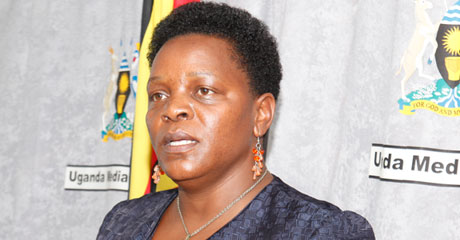Uganda is today (8th March 2017), joining the rest of the world to commemorate the International Women’s Day.
This is an annual observance that was declared by the United Nations in 1975 and has been marked in Uganda since 1984 under different themes. In 1991, the day was earmarked as a national public holiday in Uganda.
State minister for Gender and Culture, Peace Mutuzo (pictured up) is leading Ugandans, diplomatic corps and foreign dignitaries in Dokolo and all over the Country to mark the national celebrations at Dokolo Technical School, Dokolo Town Council.
The line-up of pre-event activities include; a medical caravan providing free cancer screening and HIV testing as well as blood donation at the venue, distribution of reusable pads in selected schools in Dokolo, Community dialogues across the district, evening film show using the Youth Truck, Health Run and Legal aid services.
His Excellency the president of Uganda Yoweri Kaguta Museveni is expected to be the chief guest.

This year’s theme is “Women’s Empowerment in the Changing World of Work” and it provides Ugandans with an opportunity to think through the changing situations at different places of work and the emerging challenges faced by women.
Minister Mutuzo said in a statement, “You will recognize that the environment at the workplace is changing rapidly. There is increased need for employable skills which calls for adaptability to these changes in order to remain competitive in the job market. Some of the employable skills needed to retain employment and progress in the world of work include; communication, problem solving, teamwork, self-management, honesty, enthusiasm, adaptability, openness to new ideas, self-confidence, being multi-skilled, proficiency in Information and Communication Technology (ICT), and ability to transfer skills from one area of life and work to another.”
The government insists is increasingly becoming probable that women, like other people, are likely to have a range of different jobs in a lifetime, or a range of roles to play throughout their lives., there is still great need to ensure that women and girls are empowered with relevant training and exposure to relevant skills to fit the job market trends.
Experts predict that there is a likelihood that we shall shift from traditional full-time permanent jobs towards more flexible and less regulated jobs, and a shift from a world where information is scarce to one of information abundance.
On the other hand, employers were likely to find it necessary to have distributed workplaces which need distributed leadership, have more automation, and lean organizations.
At the family level, there is need for changes within the household to help women cope with changes at the workplace. This will necessitate recognition and redistribution of unpaid care work among family members.
The government has ensured that there are laws and policies to facilitate this process.
For workplaces outside the homes, legal provisions are embedded in:- The Employment Act; The Labour Unions Act; The Occupational Safety and Health Act; The Labour Unions (Registration) Regulation; and The Labour Disputes (Arbitration and Settlement) Act, provide a basis for creating a levelled ground for both women and men.
The Employment Act, for instance, has provisions to cater for non-discrimination and equal payment for male and female employees for work done for the same value.
The same law requires that an employer who has more than 25 employees puts in place measures to prevent sexual harassment at the workplace.
It also provides for maternity leave and paternity leave, which are pertinent to both women and men and should be respected.
The law is also clear on weekly rest for employees and guidelines on calculation of payments and contracts, length of working hours per week, annual leave and public holidays, sick pay, giving notice to end employment, guidelines on details to be written in contracts, discipline, ending the contract, probation, unfair dismissal, and payment after dismissal.
On the other hand, the Labour Union Act provides guidelines to facilitate efficient and expeditious resolution of labour complaints and disputes, and guidelines for promoting participation of sectoral partners in decision-making in both the private and public sectors.
In terms of policies, we have the Uganda Gender Policy, the National employment Policy, The Uganda Food and Nutrition Policy and The National Population Policy that should be evoked to create an environment suitable for both women and men.
Government has initiated various Programmes including The Uganda Women Entrepreneurship Programme (UWEP), The Youth Livelihood Programme (YLP) and The National Women Council grants to accelerate women transformation.
The Uganda Women Entrepreneurship Programme is particularly celebrated as the first ever effort by the Ugandan Government to ensure that women have unabated access to credit and entrepreneurial skills. The Programme was initiated as a response to the gender biases women face while attempting to access credit and skills from mainstream financial institutions.
The Programme has now rolled out to all districts and municipalities. President Museveni has also promised to avail more funding to the Programme so that more women are reached.
In the one year of implementation (2015-2016), up to 2.952 billion Shillings has been disbursed to 577 women groups across the Country. This money has reached a total of 7, 379 individual women who are implementing joint enterprises in various sectors including agriculture, processing and art and crafts among others.

The Permanent Secretary of Ministry of Gender, Labour and Social Development has sent out a circular to all Local Governments informing them of the theme and requesting them to mark the day in their districts. Community members are implored to attend celebrations in their respective districts.

FLAGSHIP FUND
Uganda Women Entrepreneurship government fund meant to transform lives of the vulnerable women.
The five-year-project is targeting women with disabilities, women with HIV/Aids and women in hard-to-reach areas.
Each of the eight districts in Acholi sub-region (ongoing) is meant to receive a total of Shs2.480b to be distributed to the women groups, ranging from the age of 18 to 65 with membership of between 10 and 15 people.











